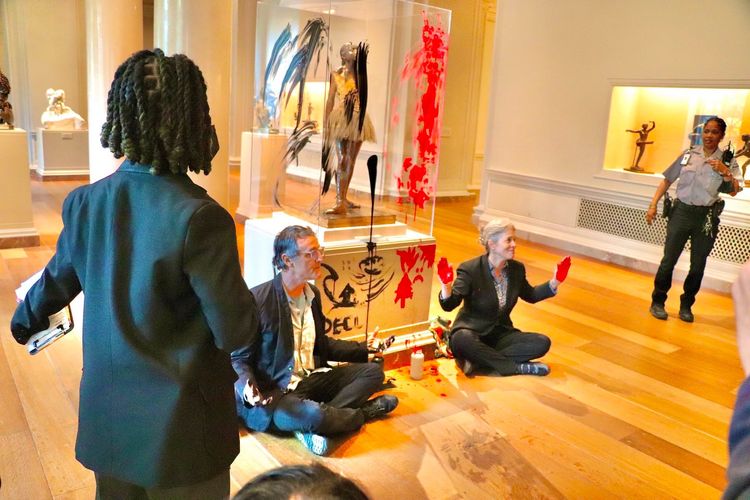Displacement and Disorientation
Displacement and Disorientation: Part 1
By Mary Annaise Heglar
I didn’t realize how tired I was until I got back to New Orleans. At first, I thought it was just that day: I’d woken up at 4:15 in the morning to drive two and a half hours from Birmingham to Opelika and pick up a fellow evacuee whose car had broken down and then drive the five and a half hours to New Orleans. I got home at 4:45 p.m.
But I was still exhausted the next day. I could barely read the words in my backlog of emails. The letters all jumbled together. On calls, the second half of my sentence disappeared before I finished the first half. I couldn’t set priorities for myself. As soon as I started to do one thing, I got distracted by another. In the evening, I had to force myself to go for a walk. I was both curious and terrified to see the devastation around the city, knowing there was precious little I could do about what had already happened. It’s been three days now and I’m still fatigued.
I thought it was just me.
Last night, I got a drink with a friend in the now tourist-free French Quarter. As excited as I was to see her and compare evacuation notes, I was nervous about my ability to hold a conversation. But pretty quickly, we found out we were both having the same experience, and forgave each other through the forgetfulness and the stumbles. Evacuation brain, we called it.
We talked about how disorienting it is to be displaced. How bizarre it feels to have come out relatively unscathed from something that devastated so many people. Survivor’s guilt, they call it. But do I really get to say I survived when I fled? I don’t know. I do know I feel like there’s so much more I should be doing, but it takes a massive effort just to make myself eat.
These words are just a stream of consciousness because it’s all I have right now. I’m sure at some point, I’ll find better words, better things to do. But for now, I want to direct you to the people who are doing things, and who need support. If you have it, give it to them:
Hurricane Ida Relief
And...as a personal favor, the bookstore that I love to go write at and is dedicated to my personal hero is struggling to take care of their staff right now. If you’re buying books, buy them from Baldwin and Co. If you have extra money, donate to their fundraiser. ‘
Displacement and Disorientation: Part 2
By Amy Westervelt
Mary's experience feels so familiar to what we were dealing with over on this side of the country last week. Even when you get out early and you're okay, displacement is disorienting and exhausting, and then because you got out early and you're okay you feel like you have no right to claiming any impact at all. Here in California, we had a miraculous day of light rain at the end of this week that's made it possible for all evacuees to return, but many don't have homes to return to. And while all eyes have been on the Caldor Fire lately, the Dixie Fire, just 100 or so miles away, real close to the town of Paradise that burned down in the 2018 Camp Fire, is still going strong. It will likely have consumed a million acres before it's out.o put that in context, Caldor is at about 220,000 acres. Around 40,000 people have been displaced. If you're able to help, you can do so here:
Caldor and Dixie Fire Relief
El Dorado Community Foundation Caldor Relief Fund
Verified GoFund Me Fire Relief Pages
California Fire Foundation’s Supplying Aid to Victims of Emergency (SAVE) program
Amador County Community Foundation
Tahoe Coalition for the Homeless
Podcast Recommendation: Scene on Radio
By Amy Westervelt
Shameless plug here: I'm co-hosting the new season of Scene on Radio, coming out this week, all about the climate crisis. If you're unfamiliar with the show, I've been recommending it for years, long before they asked me to co-host! The past three seasons have covered the creation of race and patriarchy, and why America has never quite managed to deliver on its promise of democracy—perfect setup to a season digging into the root drivers of the climate crisis and what it would take to repair society. The season starts with four episodes of history, spanning from the Old Testament and the Crusades to the Enlightenment, the Atlantic Slave Trade, drawing a line from that history to the emergence of climate denial in the 1990s. Then it leaves the U.S. for Indonesia, Nigeria, Bangladesh, Ecuador, and Scotland, before coming back here to look at how the U.S. might become a force for good in the climate fight.
Discourses of Delay Are the New False Equivalence
By Amy Westervelt
The U.S. media has only recently stopped trading in false equivalence around climate change—it's blessedly rare these days to see the old "climate scientists say this, but one climate skeptic says that" sorts of stories. But the fossil fuel industry are no dummies and long before that strategy started to fail they'd embraced another one… what social scientists have taken to calling "discourses of delay." That term was coined in a paper that came out last year that categorized the various messages Big Oil uses to encourage delay on climate action.
You're signed up for the free edition of Hot Take. Subscribe now to keep reading!
The Climate Content We Don’t Need
Between Andrew Yang starting his own political party and Jeff Bezos trying to become immortal, it’s been quite the week for wealthy celebrities and their hair-brained schemes. But what perhaps takes the cake is news of a forthcoming CBS reality show, The Activist, where co-hosts Usher, Priyanka Chopra Jonas, and Julianne Hough (yeesh) will judge activists in “head-to-head challenges to promote their causes, with their success measured via online engagement, social metrics, and hosts’ input” (YEESH). Oh, and the prize? Winner travels to the G20 Summit in Rome, plus they get celebrated at a finale feat. “musical performances by some of the world’s most passionate artists.” Let’s get LOUD, baby!
You're signed up for the free edition of Hot Take. Subscribe now to keep reading!
DIGEST
Your weekly round-up of climate coverage.
Rising Temperatures, Rising Tides
Summer 2021 Breaks Heat Record Set During the 1936 Dust Bowl, by Brian Kahn for Earther
Wildfire smoke claims more than 33,000 lives each year, new study finds, by Nathanael Johnson for Grist
"No particular timeframe" to restore Louisiana water systems, by María Paula Rubiano A. for Grist
Medical journals warn of an even bigger health threat than COVID, by Joseph Winters for Grist
Air pollution takes away billions of years of life expectancy — and many countries aren’t doing enough about it, by Joseph Winters for Grist
California Official Describes 'Sobering' Wildfire Season Outlook, in the New York Times
IPCC 2021 report: How bad will climate change get? By Umair Irfan for Vox
Climate Change Is Forcing Animals to Quickly 'Shape-Shift,' Study Suggests, by Becky Ferreira for Vice
Moving Water in the Everglades Sends a Cascade of Consequences, Some Anticipated and Some Not by Amy Green for the Inside Climate News
The Climate Presidency?
Matthew Tejada is keeping the EPA's eyes on environmental justice, by Yvette Cabrera for Grist
Biden administration says solar could provide nearly half of US electricity by 2050, by Joseph Winters for Grist
Democrats Want a ‘Climate Corps.’ They Just Can’t Agree How to Create It, by Lisa Friedman for The New York Times
Biden Speaks With Xi Amid Low Point in U.S.-China Relations, by Zolan Kanno-Youngs and David E. Sanger for The New York Times
Democrats Unveil Details of Sweeping Climate Change Spending Plan, by Coral Davenport for The New York Times
Transcript of Biden’s Speech on Climate Change and Hurricane Ida, in The New York Times
Calling ‘Code Red’ on Climate, Biden Pushes for Infrastructure Plan, by Katie Rogers and Juliet Macur for The New York Times
Biden Administration Moves to Protect Alaska’s Bristol Bay, by Lisa Friedman for The New York Times
The U.S. Is Not Ready for Climate Reality, by Brad Plumer for The New York Times
How California's Recall Vote Could Affect the State's Climate Policies, by Brad Plumer for The New York Times
Biden’s Electric Car Plans Hinge on Having Enough Chargers, by Niraj Chokshi, Matthew Goldstein and Erin Woo for the New York Times
Climate Accountability
Big Oil's 'Wokewashing' Is the New Climate Science Denialism, by our Amy Westervelt for the Guardian
Larry Elder's Claimed California Needs More Logging to Stop Wildfires, by Dharna Noor for Earther
Amazon the Company Invests in the Amazon Rainforest, by Dharna Noor for Earther
Google's Plan to Use 120% Less Water Doesn't Quite Add Up, by Florence Ion for Earther
Scottish campaigners condemn Cop26 as ‘the most exclusionary ever’ by Libby Brooks for the Guardian
Cop26 will be ‘rich nations stitch-up’ if poorer countries kept away by Covid by Lizzy Davies for the Guardian
To Meet Paris Accord Goal, Most of the World’s Fossil Fuel Reserves Must Stay in the Ground by Nicholas Kusnetz for Inside Climate News
Norway offers two new offshore areas for CO2 storage for Reuters
Justice Is Justice Is Justice
Why Right-Wing States Are Cracking Down on Indigenous Climate Protesters, by Dharna Noor for Earther
Madagascar Is Suffering Through Catastrophic Famine, by Molly Taft for Earther
Indigenous Communities a 'Sacrifice Zone' in the Wake of Ida, by Dharna Noor for Earther
2 years after the last UN climate conference, why do some activists want to postpone COP26?, by Shannon Osaka for Grist
Activists Call for Delay to UN Climate Summit, Blaming UK for Vaccine Delays By Leslie Hook for the Financial Times in Inside Climate News
Poor countries say lack of vaccines may exclude them from climate talks by Susanna Twidale for Reuters
Glimmers of Hope
World's Biggest Direct Air Capture Plant Comes Online, by Molly Taft for Earther
Indigenous resistance has cut U.S. and Canada's annual emissions, by Adam Mahoney for Grist
‘Orca,’ the largest carbon removal facility to date, is now in service, by Emily Pontecorvo for Grist
California Aims to Ban Recycling Symbols on Things That Aren’t Recyclable, by Hiroko Tabuchi and Winston Choi-Schagrin for The New York Times
F.A.A. awards $100 million in grants to efforts to reduce aviation’s environmental impact, by Niraj Chokshi for The New York Times
Lost Ice Age Landscapes Buried Under the Seafloor Have Been Mapped by Scientists, by Becky Ferreira for Vice
Climate in Culture
To solve the climate crisis, we must first repair our relationships, by Jena Brooker for Grist
Can Fashion Help Small Farmers Save the Amazon Rain Forest? By Brian Barth and Flávia Milhorance for The New Republic
Building a More Sustainable Car, From Headlamp to Tailpipe, by Eric A. Taub for The New York Times
Christian leaders unite to issue stark warning over climate crisis by Harriet Sherwood for the Guardian
(Not) the End of the World review – a terrifying, daring look at climate hypocrisies by Gareth Llŷr Evans for the Guardian
Anxiety and biscuits: the climate cafes popping up around the world by Elizabeth Gribkof for the Guardian
Plus More
Komodo Dragons Are Lurching Toward Extinction, by Isaac Schultz for Earther
These urchin slayers are trying to save California’s underwater 'rainforest', by Sierra Garcia for Grist
Glaciers are more than 'frozen, sterile wastelands', by Ysabelle Kempe for Grist
Meet the Wolf Mask-Wearing Protesters Occupying Some of Europe's Oldest Forests, by Tomasz Lesniara for Vice
Climate impact of a transatlantic flight could cost global economy $3,000 in the Guardian





Only paid subscribers can comment.
Please subscribe or sign in to join the conversation.